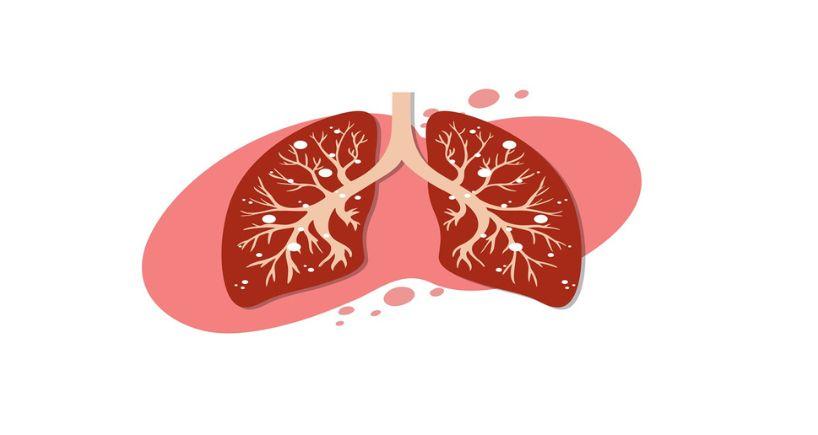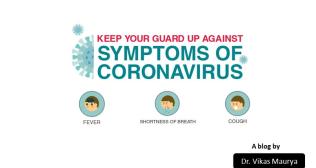
Understanding Bronchitis: Causes, Symptoms, and Treatment
A new study brings fresh revelations about the association between early-life exposure to pollution of air and lung health later in life. A research team depicted that exposure to air pollution during childhood is directly linked with bronchitis symptoms as an adult.
So much highlighted in the news...in this blog, we will pour light on what exactly is Bronchitis, its types, causes, symptoms and treatment:
What is Bronchitis?
Bronchitis refers to an inflammation of the airways leading into a person's lungs.
When a person's airways (trachea as well as bronchi) get irritated, they swell up as well as fill with mucus, causing him/her to cough. A person's cough can last days to a couple of weeks. It's the primary symptom of Bronchitis.
Viruses are the most predominant cause of acute Bronchitis. Smoke as well as other irritants can cause acute and chronic Bronchitis.
What are the types of Bronchitis?
When people talk about Bronchitis, they typically mean acute Bronchitis, a temporary condition that causes coughing. Few individuals get Bronchitis so often that it's regarded as chronic Bronchitis.
Acute Bronchitis
A viral infection usually causes Acute Bronchitis, which generally goes away in a few weeks. Most people don't require treatment for acute Bronchitis.
Chronic Bronchitis
If a person has persistent cough with mucus for three months out of the 12 months and this continues for at least two years, person might be suffering from chronic Bronchitis.
If a person has chronic Bronchitis, he/she may have chronic obstructive pulmonary disease (COPD).
Who does Bronchitis impact?
Anyone can get Bronchitis, but an individual is at higher risk if he/she:
- Smoke or are around someone who does (Passive smoking).
- Have asthma, COPD, or other breathing conditions.
- Have GERD (chronic acid reflux).
- Suffering from an autoimmune disorder or other illness that causes inflammation.
- Are around air pollutants (such as smoke/chemicals).
Bronchitis during pregnancy
Changes in fetal sex hormones and alterations in maternal immunity cause Bronchitis in pregnant women. Based on the severity, Bronchitis affects the health of the mother and the fetus. A mother's shortness of breath can lead to a dearth of oxygen supply to the fetus, threatening miscarriage.
What are the symptoms of Bronchitis?
A persistent cough that lasts one-three weeks is the main symptom of Bronchitis. A person generally brings up mucus when he/she coughs with Bronchitis, but he/she might get a dry cough instead. He/she might also hear a whistling or rattling sound when you breathe (wheezing).
Person might have other symptoms, including:
- Shortness of breath (dyspnea).
- Fever.
- Runny nose.
- Tiredness (fatigue).
What causes Bronchitis?
Any person almost always gets Bronchitis from a viral agent. However, nearly anything that irritates individual's airways can cause it. Infectious and noninfectious causes of Bronchitis comprise:
Viruses
Ones that cause Bronchitis comprise adenovirus, influenza (the flu), respiratory syncytial virus (RSV), rhinovirus (the common cold), as well as coronavirus.
Bacteria
Ones that cause Bronchitis include Bordetella pertussis, Mycoplasma pneumonia, and Chlamydia pneumonia.
Pollution
Smoking cigarettes or marijuana (cannabis).
How does one get Bronchitis?
A person gets Bronchitis when his/her airways swell up and fill with mucus. A person can get the viruses and bacteria that cause Bronchitis from close contact (hugging, shaking hands, touching the same surfaces) with someone who has them.
Other irritants, like tobacco or pollutants, are in the air.
How is Bronchitis treated?
Acute Bronchitis is generally not treated with medications. If a person has the flu and his/her symptoms start within the past two days, healthcare providers may prescribe antivirals to help it go away rapidly.
Since bacteria almost never cause Bronchitis, antibiotics won't help a person get better and might even make him/her feel worse.
What medications are utilised to treat Bronchitis?
The patient's healthcare provider won't prescribe medications to treat his/her Bronchitis. In a few cases, patients can utilise medications, including:
Antiviral medications. If the flu is the trigger for Bronchitis, a person’s healthcare provider might prescribe an antiviral medicine, like Tamiflu®, Relenza®, and Rapivab®.
Bronchodilators: If a person is having trouble breathing, healthcare provider might prescribe a bronchodilator (a drug that aids open individual's airways).
Anti-inflammatory medications: The patient's doctor might prescribe corticosteroids and other medications to lessen inflammation.
Cough suppressants: Over the counter/prescription cough suppressants (antitussives) may aid with a nagging cough. These comprise dextromethorphan and benzonatate.
Antibiotics: Unless a person's healthcare provider thinks he/she has a bacterial infection, it's doubtful that he/she will be treated with antibiotics for Bronchitis.
COPD/asthma treatment. If a person has COPD or asthma, the healthcare provider may prescribe additional medications or breathing treatments for chronic Bronchitis.
In a nutshell, Bronchitis is when the airways leading to a person's lungs (trachea and bronchi) get inflamed and filled with mucus. As the body tries to get rid of the mucus, an individual gets a nagging cough, which can last two/more weeks. Acute Bronchitis is generally caused by a virus and goes away on its own whereas Chronic Bronchitis never actually goes away but can be managed.
Popular Searches :
Hospitals: Cancer Hospital in Delhi | Best Heart Hospital in Delhi | Hospital in Amritsar | Hospital in Ludhiana | Hospitals in Mohali | Hospital in Faridabad | Hospitals in Gurgaon | Best Hospital in Jaipur | Hospitals in Greater Noida | Hospitals in Noida | Best Kidney Hospital in Kolkata | Best Hospital in Kolkata | Hospitals in Rajajinagar Bangalore | Hospitals in Richmond Road Bangalore | Hospitals in Nagarbhavi Bangalore | Hospital in Kalyan West | Hospitals in Mulund | Best Hospital in India | | Cardiology Hospital in India | Best Cancer Hospital in India | Best Cardiology Hospital in India | Best Oncology Hospital In India | Best Cancer Hospital in Delhi | Best Liver Transplant Hospital in India
Doctors: Dr. Rana Patir | Dr. Rajesh Benny | Dr. Rahul Bhargava | Dr. Jayant Arora | Dr. Anoop Misra | Dr. Manu Tiwari | Dr. Praveer Agarwal | Dr. Arup Ratan Dutta | Dr. Meenakshi Ahuja | Dr. Anoop Jhurani | Dr. Shivaji Basu | Dr. Subhash Jangid | Dr. Atul Mathur | Dr. Gurinder Bedi | Dr. Monika Wadhawan | Dr. Debasis Datta | Dr. Shrinivas Narayan | Dr. Praveen Gupta | Dr. Nitin Jha | Dr. Raghu Nagaraj | Dr. Ashok Seth | Dr. Sandeep Vaishya | Dr. Atul Mishra | Dr. Z S Meharwal | Dr. Ajay Bhalla | Dr. Atul Kumar Mittal | Dr. Arvind Kumar Khurana | Dr. Narayan Hulse | Dr. Samir Parikh | Dr. Amit Javed | Dr. Narayan Banerjee | Dr. Bimlesh Dhar Pandey | Dr. Arghya Chattopadhyay | Dr. G.R. Vijay Kumar | Dr Ashok Gupta | Dr. Gourdas Choudhuri | Dr. Sushrut Singh | Dr. N.C. Krishnamani | Dr. Atampreet Singh | Dr. Vivek Jawali | Dr. Sanjeev Gulati | Dr. Amite Pankaj Aggarwal | Dr. Ajay Kaul | Dr. Sunita Varma | Dr. Manoj Kumar Goel | Dr. R Muralidharan | Dr. Sushmita Roychowdhury | Dr. T.S. MAHANT | Dr. UDIPTA RAY | Dr. Aparna Jaswal | Dr. Ravul Jindal | Dr. Savyasachi Saxena | Dr. Ajay Kumar Kriplani | Dr. Nitesh Rohatgi | Dr. Anupam Jindal |
Specialties: Heart Lung Transplant | Orthopedic | Cardiology Interventional | Obstetrics & Gynaecology | Onco Radiation | Neurosurgery | Interventional Cardiology | Gastroenterologist in Jaipur | Neuro Physician | Gynecologist in Kolkata | Best Neurologist in India | Liver Transfer



















